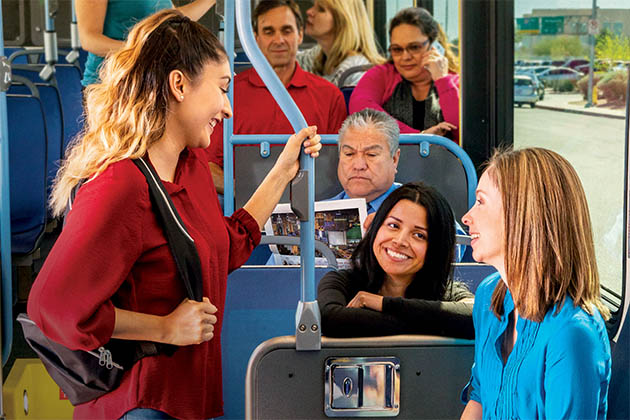Innovations
The RTC and its partners continue to lead the way in testing and integrating new smart mobility technologies. This is in large part due to the RTC’s Traffic Management Center, the nation’s first truly integrated Intelligent Transportation System (ITS) operating across all jurisdictions in the region.
Below are some of the roadway infrastructure and transit infrastructure projects that the RTC is currently engaged in:
Data Driven Insights
Waycare
Waycare helps improve safety and efficiency on freeways and major arterials by compiling and analyzing data to report in real-time the location of accidents and predict where dangerous driving conditions or congestion may occur. This technology enables faster validation and response to roadway incidents as well as a more efficient use of resources to proactively deploy traffic patrols and abatement efforts with the goal of preventing incidents. Since piloting this platform on a stretch of a busy freeway, Southern Nevada has seen a 17-percent reduction in the number of primary crashes, and public safety partners are responding to incidents up to 12 minutes faster.
GeoTab
Geotab is a global leader in telematics, providing open platform fleet management solutions to businesses of all sizes. Geotab’s intuitive, full-featured solutions help businesses better manage their drivers and vehicles by extracting accurate and actionable intelligence from real-time and historical trips data.
Improving Safety & Reducing Congestion
Smart Work Zones
Nexar
Nexar is an app that uses smartphone dash cams and wireless technology to provide drivers real-time alerts to prevent vehicle, cyclist and pedestrian collisions. The app records video outside a vehicle and measures vehicle dynamics related to speed, braking and turns. Warnings from adjacent vehicles are communicated to drivers via the app, such as the need to brake for a hazard. The RTC is using the artificial-intelligence program to crowdsource information about traffic cones in construction work zones, unauthorized road closures, and other road obstructions to help mitigate congestion.
HAAS Alert
The HAAS Alert system is a unique technology that allows smart devices to broadcast the location of construction vehicles, first response vehicles, construction equipment and construction workers from inside a construction work zone to the traveling public to other types of platforms such as the Waze traffic app. The RTC is piloting the HAAS Alert system within vehicles to help alert the traveling public of active construction work zones around Southern Nevada.
Pedestrian Detection Pilot
Pedestrian fatalities continue to be an epidemic in Southern Nevada. As part of its Intelligent Mobility Initiative, a team at the University of Nevada, Reno (UNR) is working with the RTC and the City of Henderson to engage in a pilot using roadside LiDAR sensors to collect pedestrian/vehicle trajectories at three intersections. By obtaining real-world data on the activity of pedestrians at these busy intersections, the RTC can better understand pedestrian behaviors and determine what additional engineering, equipment or countermeasures may be needed to increase pedestrian safety.
Adaptive Traffic Signal Pilot
The RTC is currently piloting an Adaptive Traffic Signal Pilot Project to test the ability of adaptive traffic signal control technology to improve performance of the traffic signal system. The technology has been deployed along a busy stretch of Eastern Avenue between Beckler Drive and Pebble Road to determine the capabilities and limitations of an adaptive traffic control system. Visit the project webpage to learn more.
Connecting People to Services
Shared Mobility
The RTC partnered with ride-sharing company Lyft on a first-mile/last-mile program to help employees of a warehouse located in an area not served by transit. Employees can hail a Lyft from 13 designated transit stops served by six transit routes and get a ride to the warehouse. The RTC subsidizes $1 per trip, and the employer pays for the remaining balance for each employee trip to and from the designated bus stops. The Workforce Mobility Program makes transportation more cost-effective and jobs more accessible.
Innovation Grants
GoMed
The U.S. Department of Transportation awarded a $5.3 million grant to the RTC and City of Las Vegas to deploy an autonomous circulator between downtown Las Vegas and the Las Vegas Medical District. This federal demonstration project will connect some of Southern Nevada’s most vulnerable populations, including elderly residents and persons with disabilities, to key facilities and vital services like healthcare, education and employment. Users will experience autonomous and connected vehicle service, innovative pedestrian safety devices and smart transit shelters intended to enhance safety and improve quality of life.
Low or No Emission
A $3.8 million grant from the U.S. Department of Transportation allows the RTC to deploy two hydrogen fuel cell buses and installed accompanying hydrogen-fueling infrastructure. The RTC estimated the project will cost $6 million, with a 65% federal and 35% local split. With the estimated 18-month wait time to procure hydrogen fuel cell buses, it is anticipated the vehicles will hit Las Vegas Valley roads in 2023.
Mobility for All
The Federal Transit Administration awarded $128,624 to the RTC to educate the community about transportation options and available technology. The grant will fund a mobile training lab to bring RTC mobility trainers and resources to members of the community, including veterans, persons with disabilities and low-income populations. The vehicle retrofit is expected to be completed and ready to deploy June 2023.
Advanced Transportation and Congestion Management Technologies Deployment (ATCMTD) Grant
The U.S. Department of Transportation's Federal Highway Administration awarded $6 million in federal funding to the RTC, the Nevada Department of Transportation, and its partners for the expansion of emerging technologies along a five-mile stretch of U.S. 95 to mitigate traffic congestion and enhance road safety. Some technologies that will be deployed along U.S. 95 include wrong-way sensors that alert drivers immediately if they’re traveling in the wrong direction; occupancy detection sensors in HOV lanes that collect data to reduce congestion and emissions; and overhead signs that warn motorists about incidents, speed reduction and lane closures ahead to mitigate crashes resulting from sudden braking.








































